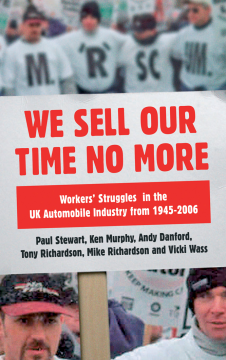
BOOK
We Sell Our Time No More
Paul Stewart | Mike Richardson | Andy Danford | Ken Murphy | Tony Richardson | Vicki Wass
(2009)
Additional Information
Book Details
Abstract
This is the story of workers' struggles in the British car industry, from the Second World War until today.
Told from the viewpoint of the workers, the book chronicles how they responded to a variety of management and union strategies, from piece rate working, through measured day work, and eventually to 'lean production' beginning in the late 1980s.
Focusing on two companies, Vauxhall-GM and Rover/BMW, this book shows how they developed their approaches to managing labour relations. It highlights the success of various forms of struggle to establish safer and more humane working environments, as well as their failures.
Table of Contents
| Section Title | Page | Action | Price |
|---|---|---|---|
| Cover | Cover | ||
| Contents | v | ||
| Preface | ix | ||
| Acknowledgements | xii | ||
| Abbreviations and Acronyms | xiii | ||
| 1. Understanding the Lean Automobile Industry | 1 | ||
| Introduction | 1 | ||
| Lean Production; the Context and the Promises | 2 | ||
| Lean Production for Whom? | 8 | ||
| Objectives of the Book | 13 | ||
| 2. The Prehistory of Lean Production: Employee Relations in the British Automobile Industry Since the Second World War | 16 | ||
| Introduction | 16 | ||
| Regimes of Control: From Piecework to Measured Day Work | 19 | ||
| Contemporary Contrasts and Continuities | 20 | ||
| Bargaining in the Context of Local Communities | 22 | ||
| Wages, Unions and Conflicts in the British System | 26 | ||
| Regimes of Control: Measured Day Work and the Rise of Lean Production | 34 | ||
| 3. From 'Embrace and Change' to 'Engage and Change': Trade Unions Renewal and New Management Strategies | 38 | ||
| Introduction | 38 | ||
| Industrial Relations without Industrial Relations? | 39 | ||
| Data and Method | 41 | ||
| Union Responses in Each Company | 43 | ||
| Rover: 'Embrace and Change' | 44 | ||
| Vauxhall: 'Engage and Change' | 46 | ||
| The Experience of NMTs on the Shopfloor: An Inter-Company Comparison | 49 | ||
| The Acceptance of NMTs on the Shopfloor: An Inter-Company Comparison | 56 | ||
| Concluding Remarks | 59 | ||
| Appendix: Explanatory variables | 62 | ||
| 4. Striking Smarter and Harder: The New Industrail Relations of Lean Production? The 1995-6 Vauxhall Dispute | 64 | ||
| Management Misjudges the Shopfloor | 67 | ||
| Confronting Lean: Laying the Basis for Union Advance | 70 | ||
| Conclusion | 79 | ||
| The History of the Fight to Control Lean Production | 80 | ||
| Addendum: Data Summary | 84 | ||
| 5. Round Table Discussion on Lean Production | 90 | ||
| Introduction | 90 | ||
| Lean Production | 98 | ||
| Lean and Outsourcing | 100 | ||
| Union, Shop Stewards and Lean\" Capturing Hearts and Minds | 107 | ||
| Comments from Ken Murphy | 120 | ||
| Comments from John Cooper | 125 | ||
| Comments from Gary Lindsay | 126 | ||
| 6. Rover-BMW: From Rover Tomorrow to the Longbridge Closure and the Bitter Fruits of Lean Production | 129 | ||
| Introduction | 129 | ||
| The Recent Origins of the Crisis: Lean Production and the Rise of a New Management Regime | 131 | ||
| The Background to the Implementation of Rover Tomorrow | 131 | ||
| Rover Tomorrow | 135 | ||
| Implementation of Rover Tomorrow | 139 | ||
| The 1998 Cowley Agreement | 142 | ||
| The Working Time Account | 143 | ||
| A New Model, the Rover 75 | 143 | ||
| The Longbridge Crisis, October 1998 | 144 | ||
| Implementation of the 1998 Agreement | 146 | ||
| Crisis 2000 - What Future for Longbridge? | 149 | ||
| The Demonstration for Longbridge, 1 April 2000 | 152 | ||
| The Union Position Changes | 154 | ||
| 7. Lean Production: From 'Engage and Change' to Endless Change | 159 | ||
| Introduction | 159 | ||
| Embedding Lean Production at Vauxhall-GM, 1989-2001 | 163 | ||
| GM’S PROJECT OLYMPIA 2001, BMW AND PARTNERSHIP | 168 | ||
| Worker Attributes | 171 | ||
| Workplace Stress | 184 | ||
| Conclusion | 196 | ||
| Appendix: Project Olympia Framework Document | 197 | ||
| Conclusion: Lean Production and the Individualisation of Workplace Stress: The New Class Struggle from Above | 201 | ||
| Worker and Union Responses to Lean | 208 | ||
| Challenging Lean Production as a Strategy and Ideology | 209 | ||
| APPENDIX 1: SURVEY OF CAR WORKERS BY THE TGWU AND CARDIFF UNIVERSITY TRADE UNION RESEARCH UNIT (QUESTIONNAIRE 1996) | 214 | ||
| APPENDIX 2: WORKFORCE SURVEY ON WORKPLACE ISSUES | 219 | ||
| APPENDIX 3: WORKING ON THE LINE ‘AFTER FORDISM’: A DIARY | 223 | ||
| Notes | 229 | ||
| Bibliography | 240 | ||
| Index | 252 |
